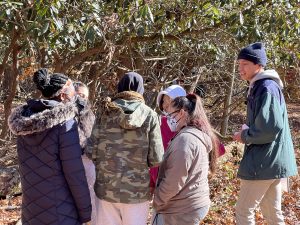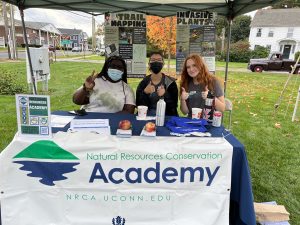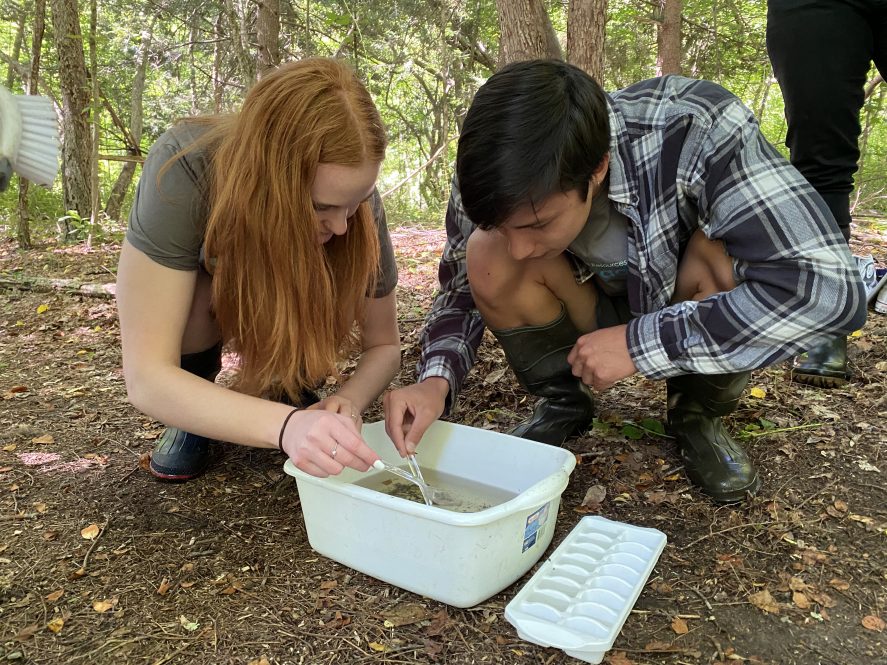Having a mentor can be vital to starting out on the right path in life.
On a cold November day, I discuss this with two City of Hartford forestry crew members as we warm ourselves in a patch of sunlight while trucks rumble by, loaded with massive logs and debris from a tree that had just been harvested from somewhere in the city.
One of the crew members mentions that he started on a completely different career trajectory, only to later become aware that forestry was a potential job after speaking with a friend’s dad. That conversation, he says, made all the difference. With that information, he completely changed paths and now spends his time outdoors doing a job he loves.
A new initiative from UConn’s Natural Resources Conservation Academy (NRCA), the Difference Maker Mentor program, is working to foster this dynamic of sharing skills and information by training a new generation of mentors.

On this November day, we are gathered in an area of Keney Park in the capital city that serves as an outdoor education center where a workshop is taking place in collaboration between the Keney Park Sustainability Project and NRCA.
The DMM program is in its pilot year, explains Assistant Extension Professor in the Department of Natural Resources and the Environment Laura Cisneros. The program pairs college student mentoring interns with high school students who work together to develop projects geared toward raising awareness of various sustainability concepts within their communities.
The Difference Makers have worked to partner with the organizers of today’s workshop as part of their DMM experience, just one of many DMM projects currently underway.
Students from Bulkeley High School soon arrive, and while watching the students and educators engage during the workshop, it is easy to see the power of bringing people together to share knowledge and connect.
Michio Agresta ’22 (CAHNR) leads the students through a tree identification exercise, and the students learn how to transform a tree trunk into lumber with Associate Extension Professor and UConn Extension Forester Tom Worthley.
By the end of the workshop, it is clear that the lessons have resonated, especially for a handful of students who are eager to finish milling the final log, who seem reluctant to board the bus before they’re finished.
“Maybe we have some future foresters here,” says Cisneros with a smile.
The planning process and DMM program overall have been fruitful, says Meg Sanders ’22 (CAHNR).
“One thing that I loved about the program is the opportunity for us to build relationships, both with our mentors and with our mentees.”
At the beginning of the program, Sanders says she struggled a little with building relationships, but that soon the connections were forged.
“It was rewarding for me to watch my mentees grow into passionate environmental advocates. One of my mentees told me that they had a lot of fun and they’ll miss it. It is great to know that it was meaningful to them,” she says.

The Difference Makers hone skills like: how to connect with members of the community, how to organize, public speaking, and even how to draft a professional email, says Celine Agbotey ‘23 (CLAS).
“I can now say that I have these skills that I did not have before and that is a great part of this whole process.”
The DMM program has also helped Agbotey realize that as an applied math major, those skills can be applied to a career in ecology.
“I always thought that was sort of out of bounds for me but realizing that I could pursue a data analysis position in the field of ecology has been huge.”
Ankit K Singh, an NRE Ph.D. candidate, is the graduate mentor of the DMM program who is helping to coordinate projects and provide professional development opportunities for the mentoring interns. Singh is also working with his own high school mentee teams.
“We’ve covered many avenues of growth that I think are important such as dealing with imposter syndrome, time management, and writing, for example,” he says.
The program is structured as a multi-layered mentorship opportunity, says Cisneros, with Singh providing resources and assistance to the mentoring interns on their journey as mentors with the high school students.
Along with new skills, Agresta says one of the things he is most proud of is the focus on various aspects of environmental justice.
“A lot of the DMM projects look at the connections between human rights and environmental impacts and how these topics disproportionately affect different groups of people,” he says. “I really appreciate the opportunity to work on those projects or bring up our own ideas of what we could be working on as a group or as an individual.”
Caitlin Daddona ’22 (CAHNR) says these relationships are a vital part of the program.
“I think the most powerful part of this mentorship program, and program at large, is an acknowledgment that community action starts from valuing each other’s opinions, building trust and relationships,” she says. “We cannot unlearn harmful human-environmental patterns if we cannot talk with our fellow humans about what those patterns are. Trusting conversations between age groups, focusing on a shared place, can create a really brave, safe, and productive space.”



